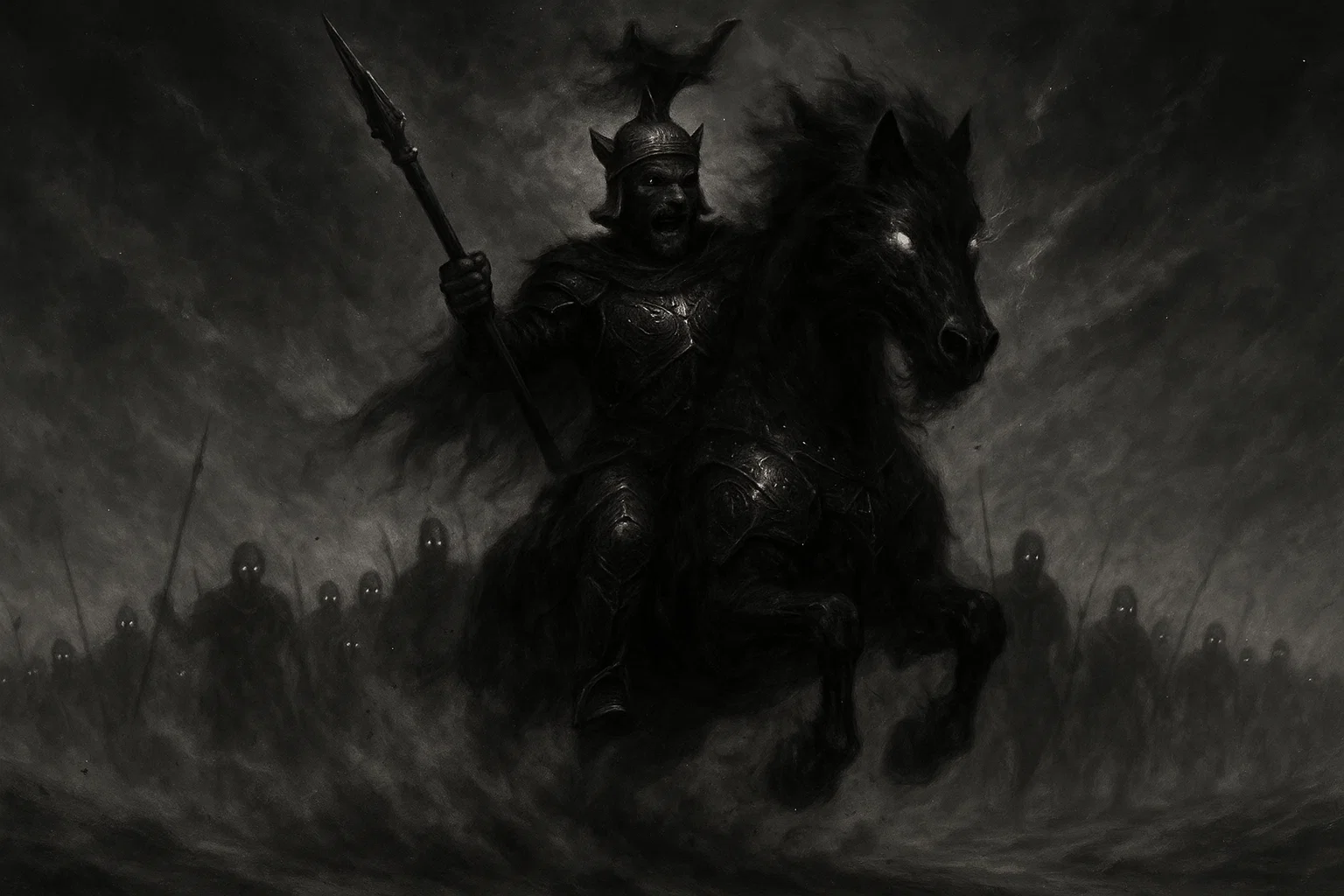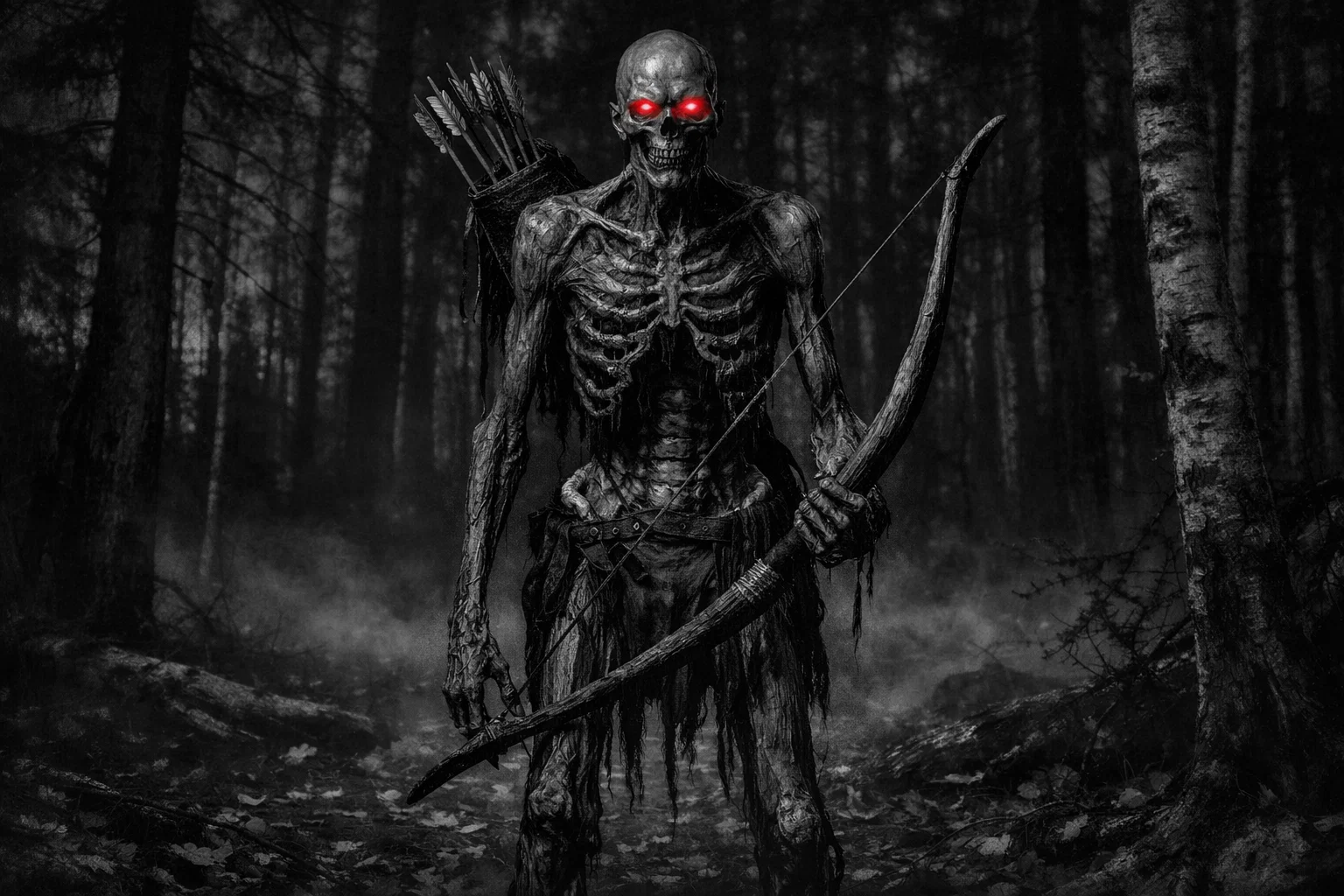Cimejes (or Cimeies, Kimaris, Kimaries) is a powerful demonic entity primarily cataloged in various grimoires of the Western Esoteric Tradition, most notably the Lesser Key of Solomon. He has the rank of a Marquis in the infernal hierarchy, commanding a significant legion of lesser demons.
Cimejes is depicted as a martial and learned demon, specializing in the discovery of lost objects, treasures, and hidden knowledge, particularly concerning logic, grammar, and rhetoric. He is also uniquely associated with being the ruler of the demons in Africa.
Summary
Key Takeaways
| Attribute | Details |
| Name | Cimejes, Cimeies, Kimaris, Kimaries |
| Title | Marquis |
| Gender | Male |
| Origin | A fallen angel, now ranked as a Marquis in Hell’s hierarchy, as codified in the Ars Goetia. |
| Appearance | A valorously great Black Warrior on a Black Horse, sometimes described as having the head of a Legionary (or a man with a helmet), or the head of a wolf. |
| Hierarchy | Marquis, the 20th spirit listed in the Ars Goetia. |
| Superior Demon | Lucifer, Beelzebub, or a Grand Duke/King of Hell, depending on the specific hierarchy interpretation. |
| Servitors | Commands twenty legions of lesser spirits. |
| Associated Figures | King Solomon (as the one who bound the spirit), various medieval and Renaissance occultists and summoners. |
| Powers | Can find lost treasures and hidden items, teaches logic, grammar, and rhetoric, makes the summoner a soldier/warrior in the similitude of his own, and grants information on the ruler of Africa and his spirits. |
| Weaknesses | Subordinate to the command of the ritual magician who possesses the divine authority attributed to King Solomon and operates under the constraints of the Goetic tradition (e.g., the Triangle of Art). |
| Opposing Angel/Saint | Not explicitly named, but often associated with the angelic choir of Dominions (Kyriotetes) or Virtues (Dynameis), as he is a Marquis. |
| Equipment/Tools | A black horse upon which he rides, often armed or equipped as a warrior. |
| Pantheon | Christian Demonology, Western Esoteric Tradition, Goetic Tradition. |
| Notable Myths | Primarily mentioned in the Goetic grimoires (e.g., The Lesser Key of Solomon) as a spirit to be summoned and commanded. |
Etymology
The name Cimejes (or Kimaris) lacks a clearly established, widely accepted etymological root in classical languages or ancient Near Eastern texts, unlike some other spirits in the Ars Goetia. The origin is most likely to be found within occult traditions that codified the spirit’s name.
The most common spelling, Cimejes, is present in the Latin Pseudomonarchia Daemonum by Johann Weyer (1563) and the English Lesser Key of Solomon (circa 17th century). The variant Kimaris, found in some versions of the Lesser Key, suggests a possible, though highly speculative, connection to other classical or non-Western names.
Some researchers have suggested a remote and unproven link to Cimmerius or the Cimmerians, a historical people mentioned in Greek literature, but this is generally considered a folk etymology, given the spirit’s association with Africa rather than the Cimmerian regions.
The name’s enduring mystery is characteristic of many Goetic spirits, whose titles may be corruptions of foreign words, obscure Hebrew names, or simply cryptographic inventions by early medieval or Renaissance esotericists.
In the context of the grimoires, the name Cimejes functions primarily as a vowel-sound key used in the ritual invocation to call the entity. Its meaning is thus derived from its function—as the name of the spirit who bestows knowledge, finds treasure, and commands twenty legions—rather than a linguistic root.
Why Do So Many Successful People Secretly Wear a Little Blue Eye?
Limited time offer: 28% OFF. For thousands of years, the Turkish Evil Eye has quietly guarded wearers from the unseen effects of jealousy and malice. This authentic blue glass amulet on a soft leather cord is the real thing – beautiful, powerful, and ready for you.
What Does the Demon Cimejes Looks Like?
The physical description of Cimejes is consistent across the key grimoires that mention him, focusing on a striking martial appearance. He is uniformly described as a valorously great Black Warrior.
In the Lesser Key of Solomon (Ars Goetia), he is specifically noted to ride upon a black horse (Equo nigro). The most distinctive physical trait is his head. Weyer’s Pseudomonarchia Daemonum describes him as having the head of a Legionary (caput legionarii), which is interpreted as a man’s head with a helmet.
Other traditions and artistic interpretations, however, sometimes depict his head as that of a wolf or a man with a wolf’s face, though the warrior’s head is considered the original and primary description in the texts.
His overall bearing is one of strength and martial prowess, embodying his rank as a Marquis and his abilities in giving the summoner the attributes of a soldier.
The black color associated with the warrior and his horse symbolizes the infernal nature and the hidden, chthonic aspects of his powers, such as the finding of buried treasures. The image is one of a commanding, dark cavalryman, instantly recognizable within the Goetic pantheon.
You May Also Like: Merihem: The Demon of Pestilence and the Red Death
Historical and Mythological Background
The primary documentation of Cimejes resides within the highly structured texts of Western ceremonial magic and the Goetic tradition.
Unlike major demons such as Lucifer or Asmodeus, Cimejes does not feature in earlier biblical or ancient mythological narratives, nor is he associated with specific historical battles or temptresses. His entire existence in the lore is dedicated to his function as a controlled, compliant spirit within the framework of the Solomonic grimoires.
Cimejes’s Role in the Lesser Key of Solomon (Ars Goetia)
Cimejes is listed as the Twentieth Spirit in the Ars Goetia, the first book of the Lesser Key of Solomon. This text outlines the seventy-two spirits King Solomon reputedly sealed in a brass vessel, compelling them to serve him.
The text describes Cimejes as a Great and Mighty Marquis, commanding twenty Legions of Inferior Spirits. His purpose is strictly utilitarian for the ritual magician. When he is summoned and appears, he is meant to fulfill several key functions.
First, he teaches the liberal sciences of Logic, Grammar, and Rhetoric, which were vital components of medieval and Renaissance education. Second, he has the power to discover lost or hidden things (including treasures and gold, which he guards). Third, he gives the summoner the ability to be a soldier/warrior in the similitude of his own, suggesting he can grant martial ability or an intimidating presence.
Finally, Cimejes is a unique information source, as he reveals the location of the ruler of Africa and his spirits. This specific association with Africa sets him apart from many other Goetic demons.
Historical Mentions
The core information on Cimejes comes from the primary texts that codified the Goetic system.
| Text/Grimoire | Year | Description | Excerpt |
| Pseudomonarchia Daemonum (Appendix to Weyer’s De praestigiis daemonum) | 1563 | A Great Marquis who appears as a warrior with a helmet on a black horse. He teaches the arts of grammar, rhetoric, and logic, finds treasures, and rules twenty legions. | “Cimeries, or Cimeies, is a great marques, like a valiant souldier on a blacke horse; he ruleth in Africa, and teacheth perfectlie Grammar, Rhetoricke, and Logicke. He discovereth treasures and things hidden, being subiect to everie exorcist, and hath charge of twentie legions.” |
| The Lesser Key of Solomon (Ars Goetia, Book I) | c. 17th Century | The Twentieth Spirit, a Mighty and Great Marquis. He rides a great black horse, appears as a great black warrior, and commands twenty legions. He finds treasures, teaches the Liberal Sciences (Grammar, Rhetoric, Logic), and gives information on the ruler of Africa. | “The Twentieth Spirit is Cimejes, otherwise Cimeies, otherwise Kimaris. He is a Great and Mighty Marquis, commanding in the parts of Africa, and hath under him twenty Legions of Inferior Spirits. He rideth upon a Great Black Horse, and is himself a Great Black Warrior, with the Head of a Legionary. His Office is to teach perfectly Grammar, Rhetoric, and Logic. He also discovereth hidden treasures, and things that are lost. He also causeth a man to put on the shape of a soldier of his own kind.” |
Ever Walk Into a Room and Instantly Feel Something Watching You?
Millions have used burning sage to force out unwanted energies and ghosts. This concentrated White Sage & Palo Santo spray does the same job in seconds – just a few spritzes instantly lifts stagnation, breaks attachments, and restores peace most people feel immediately.
Cimejes’s Powers and Abilities
Cimejes’s powers are not focused on general malevolence or tempting humans to sin but on practical knowledge acquisition and martial/material gain for the summoner. His abilities are highly specialized within the context of the Solomonic magical system.
As a teacher, Cimejes offers intellectual enrichment, teaching the highly valued Trivium of medieval education: Logic, Grammar, and Rhetoric. These skills are powerful tools that can be used to dominate, persuade, and deceive in the mortal world. For a summoner, mastery of rhetoric allows for manipulation, while logic aids in ruthlessly outmaneuvering rivals.
His most notable material power is his ability to locate and reveal hidden or lost items, particularly treasures and gold. This power can corrupt by enabling the summoner’s greed and facilitating the acquisition of ill-gotten wealth.
The promise of unguarded, hidden riches is a strong material temptation. Finally, his power to make a man “put on the shape of a soldier of his own kind” or, in a symbolic sense, simply become a valiant warrior can tempt a summoner toward pride, violence, and military aggression.
| Power/Ability | Description | Source (e.g., Grimoire) | How It Tempts/Corrupts Humans |
| Teaching the Trivium | Teaches Logic, Grammar, and Rhetoric perfectly. | Ars Goetia, Pseudomonarchia Daemonum | Enables intellectual arrogance, manipulation, and deceptive persuasion of others. |
| Treasure Discovery | Can discover things that are lost or hidden, including gold and treasure. | Ars Goetia, Pseudomonarchia Daemonum | Fuels greed and the pursuit of material wealth by illicit means. |
| Martial Endowment | Makes the summoner a soldier/warrior in his own image/similitude. | Ars Goetia | Tempts to violence, aggression, and a lust for power or dominance. |
| African Lore | Gives knowledge regarding the ruler of Africa and his spirits. | Ars Goetia | Provides esoteric or political advantage through control or understanding of foreign spiritual forces. |
You May Also Like: Utukku: The Faceless Shadow Demon of Mesopotamia
How to Counter Cimejes’s Powers
Countering a Goetic spirit like Cimejes involves the use of sacred ritual technology rather than simple prayer or exorcism, as he is generally considered an entity to be commanded, not merely banished.
The primary method for countering Cimejes’s influence or compelling his obedience is the use of the Divine Name. According to the Solomonic tradition, the summoner must invoke the authority of God (represented by the seal, staff, and Divine names) to force the demon to appear and serve.
The text states he is “subiect to everie exorcist.” Specifically, the Magic Ring or Seal of Solomon is necessary to protect the summoner from Cimejes’s attempts to overwhelm or confuse them.
To resist the temptation of his gifts (greed, intellectual pride, violence), the individual would need to cultivate the opposing virtues: humility, charity, and self-control.
If he is summoned to find a treasure, the summoner must ensure they are properly guarded and use the discovered wealth responsibly. The demon is bound by a higher power. He can only be commanded when the magician strictly adheres to the ritual constraints of the grimoire.
Cimejes’s Role in the Hierarchy of Hell
The demon holds the prestigious rank of Marquis in the infernal hierarchy, a position of considerable authority. This places him below the highest-ranking Dukes and Kings but well above the lower echelons of spirits and minor demons.
In the structure presented by the Ars Goetia, Cimejes is the 20th spirit. He commands an immense force of twenty legions (approximately 6,666 spirits per legion in some interpretations, totaling around 133,320 subordinate demons).
As a Marquis, he is understood to be subordinate to the Great Kings and Emperors of Hell (such as Lucifer, Beelzebub, or Paimon), and ultimately, like all the Goetic spirits, he is subordinate to the power of the Almighty God invoked by the ritual magician.
His specific assignment to the parts of Africa suggests a geographical and political specialty within the demonic world, making him a major figure in that region.
You May Also Like: The Demon Div: The Terrifying Horned Demon of Chaos
Astrological Associations and Symbolism
This demon, like many Goetic demonic entities, is traditionally associated with specific astrological and elemental correspondences that govern the optimal time for his summoning.
In terms of Zodiacal Association, Cimejes is sometimes linked to the sign of Libra. This is due to his focus on the intellectual arts of Logic and Rhetoric, which involve balancing arguments and achieving intellectual harmony or persuasion.
His role as a martial figure on a black horse can also be tied to Mars (for his warrior aspect) or, at times, to Saturn (for his black color and chthonic link to buried treasures).
| Attribute | Association/Meaning |
| Zodiac Sign | Libra or Scorpio (due to his nature as a discoverer of hidden things) |
| Planet | Mars (martial nature, warrior aspect) or Mercury (teacher of liberal arts) |
| Element | Air (for his intellectual gifts of logic and rhetoric) |
| Direction | West (often associated with Marquees) |
| Metal | Copper (for Venus, associated with Libra) or Iron (for Mars, his warrior aspect) |
| Color | Black (for his appearance and the horse) or Violet (associated with Jupiter/Marquis rank) |
| Number | 20 (his numerical position in the Goetia) |
Cimejes’s Sigil
The sigil of Cimejes (or Kimaris) is an abstract, lineal design unique to him and found in the Lesser Key of Solomon. This sigil is a crucial component of any successful summoning ritual, as it serves as a magical signature or focusing antenna for the spirit’s energy.
The act of tracing or inscribing the sigil, often upon a metal or parchment, is considered the first step in commanding the demon. It visually represents the name and power of the entity, acting as a gateway or a key to Cimejes’s spiritual essence.
The sigil must be worn by the operator during the summoning, and it is traditionally said that if the sigil is used properly, the demon will obey and fulfill his offices. The specific geometrical structure of the sigil is derived by some esotericists from the Rose Cross or the Square of Saturn, though its exact derivation is debated.
| Symbol/Item | Association/Meaning | Use in Rituals |
| Sigil of Cimejes | The unique spiritual signature and seal of the demon. | Engraved, drawn, or worn to compel the demon to appear and obey. |
| Black Horse | His primary mode of appearance, symbolizing his martial and earthly power. | Not a traditional offering, but a visual aid to understanding his nature during evocation. |
| Incense | Frankincense or other martial/mercurial scents. | Used to create a suitable atmosphere for the spirit’s appearance. |
| Metal | Iron or Copper. | Used for making the ritual plate or seal upon which his sigil is engraved. |
You May Also Like: Dajjal, the One-Eyed Antichrist Who Deceives the World
Similar Demonic Entities
The demon’s combination of martial rank and intellectual/treasury expertise is unique. However, other Goetic demons share his focus on specific knowledge, hidden wealth, or military matters.
| Demonic Entity | Title/Rank | Primary Focus | Shared Similarity with Cimejes |
| Balam | King | Perfect answers about the past, present, and future, making men witty. | Provides secret knowledge and intellectual gifts. |
| Hagenti | President | Transmutes metals into gold and teaches wisdom. | Involvement with gold/treasure and intellectual teachings (wisdom). |
| Agares | Duke | Teaches languages, returns runaways, overthrows dignities. | Teaches intellectual knowledge; a leader with command over legions. |
| Paimon | King | Teaches all arts, sciences, and secret things; gives dignity. | Teaches the liberal sciences; a high rank with martial/dignified appearance. |
| Bifrons | Earl | Teaches astrology, geometry, herbs, and stones; lights up tombs. | Provides esoteric knowledge and reveals hidden (buried) things. |
| Zagan | King/President | Changes wine into water, blood into wine, and teaches knowledge. | Possesses transformative power; provides specific knowledge. |
| Gremory | Duke | Reveals all things past, present, and future; procures the love of women. | Reveals hidden knowledge of all things (past, present, future). |
| Furcas | Knight | Teaches philosophy, astrology, chiromancy, and pyromancy. | Provides specific intellectual and divinatory knowledge. |
| Orobas | Prince | Gives true answers about all things; gives dignities and favors. | Gives truthful, hidden information; high rank. |
You May Also Like: Empusa: The Seductive Demon That Devoured Men
Conclusion
Cimejes, the 20th spirit of the Ars Goetia, is a powerful Marquis and a distinctly functional entity within the Solomonic tradition of demonology. His identity as a Black Warrior on a Black Horse, commanding twenty legions, focuses on his martial authority and the chthonic nature of his ability to reveal hidden treasures.
His primary offices are the teaching of the liberal sciences (Logic, Grammar, and Rhetoric), the discovery of lost objects, and the provision of unique geopolitical information concerning the ruler of Africa.
He is not a demon of temptation toward classic sins like pride or lust, but rather a spirit of practical utility, whose powers tempt the summoner toward material gain and intellectual superiority. As a highly specialized being, his lore is intrinsically bound to the grimoires of Western Esotericism.









